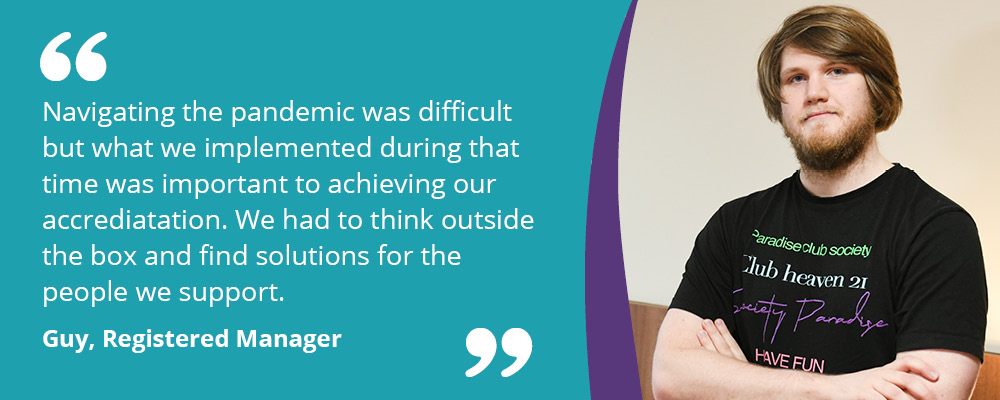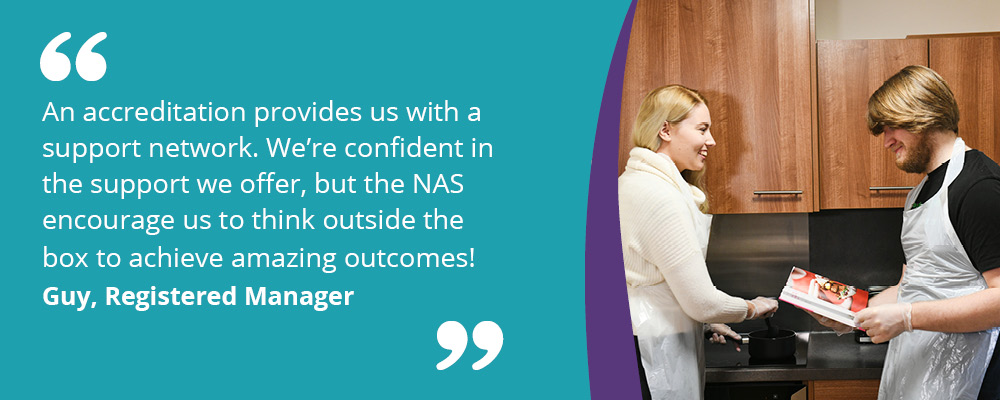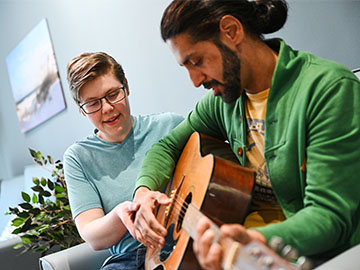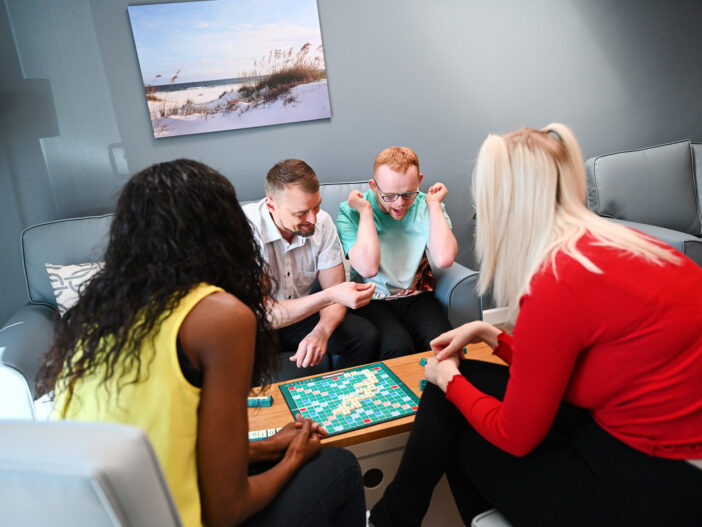Moorfields Lodge – a second National Autistic Society accreditation!
Our teams work hard to enrich the lives of the people we support. And when they receive industry-leading recognition, we like to shout about it! So, we’re delighted to announce that Moorfields Lodge are the latest recipients of a second National Autistic Society (NAS) accreditation!
Since their first accreditation in 2019, they’ve continued developing the lives of the people we support, opening up a world of opportunities for them. We spoke with Registered Manager, Guy High, to find out what a second NAS accreditation means for Moorfields Lodge and the people who live there.
What did your journey to achieving a NAS reaccreditation look like?
Our first assessment with the NAS was in 2019 and we were due to be reassessed in 2022 but postponed it because of the pandemic, as like other providers, we were short staffed. It was important to us that, when we were reassessed, we could clearly demonstrate all the good things we do, so we decided to wait.
Delaying the assessment gave us time to assemble an amazing team and integrate them into the lives of the autistic people we support – that was essential to us. The pandemic was challenging for the people who live at Moorfields Lodge. They have complex needs so building relationships with a new team and navigating an NAS assessment would have been too much disruption for them. We had to put their wellbeing first.
How did you prepare the people we support for the assessment?
It was important we didn’t do anything too unfamiliar. Most people we support enjoy a set routine and we wanted to minimise disruption. As well as demonstrating the good things we do, we wanted to demonstrate an authentic day at Moorfields Lodge! From supporting development of daily living skills, to enjoying sensory sessions, these every day activities have the biggest impact on the people we support. Keeping a sense of normality also helped take some pressure off the support as they were able to stay in the background, which alleviated their anxieties.
The assessor brought introduction forms with her. These were shared with the people we support and communicated who she was and what she would be doing during her visit. This gave reassurance that she just wanted to see what they get up to on an average day, which made them all relax a bit. Everyone was really engaged throughout the whole day and wanted to show off their skills!
Empowering people to feel included was key. They all proved to be really flexible during the assessment. Routine is important to many autistic people but with the right support they can become more agile and accepting of changes. Plus, we make sure they see different people on a regular basis – not just their housemates and support workers, which helped them adapt well to the assessment.
The report praised your community-orientated activities. How do you achieve this?
Before we start a new activity with someone, we ensure they’re comfortable with it – and that it’s something they actually want to do! Sense-checking the environment is also important. This can directly affect wellbeing, so if it’s going to trigger anxiety or challenging behaviours, we need to reconsider the activity.
Our village frequently hosts fetes and themed weekends. These events can get very busy, so taking the people we support during peak times wouldn’t be beneficial to their wellbeing either. Usually, when we venture down into the community, we go at quieter times. There are still people around, but noise levels are lower and there’s less crowds.
Taking things slowly has played an important part. We take new activities one step at a time, at a pace that’s comfortable for the individual. Each person has a unique experience of everything they do. We understand it might take someone longer to get used to going to a new café, for example.
When we have parties or events at the service, we also try to invite the neighbours over. It’s a positive experience for the people we support, and the neighbours love to get involved! Our village is small and there’s a real sense of community. Everyone’s engaged with the people living at Moorfields Lodge – we’re very lucky to live in such a great place!

Did you implement anything that was key to achieving your reaccreditation?
Navigating the pandemic was difficult but what we implemented during that time was important to achieving our reaccreditation, as all community-based activities suddenly came to a stop. We had to quickly think outside the box and find solutions for the people we support – they lost a large portion of stimulation and social engagement, which is important to their wellbeing.
Many of our housemates went to a weekly disco, which they enjoyed. We invested in some equipment and had our own discos at home. Along with some snacks, disco lights and taking it in turns to DJ, we successfully replicated this activity at home! Then, instead of going to the cinema, we had movie nights. We got a Netflix subscription, so there was plenty of choice!
For variety we also invested in a karaoke machine. Activities like this help the people we support with confidence and self-expression, so it was important we found a way to continue with them. Everyone now has more activities and can choose if they want to go out or stay at home to do them and we’ve seen great benefits as a result. The people we support adapted to the changes incredibly well and showed real strength of character during that time.
Before the pandemic, one individual had a weekly visit from his parents. They brought him sparkling water and mints each time. When we went into lockdown, he suffered with the sudden separation and couldn’t understand why his parents weren’t visiting him. We had to consider what we could do to help alleviate some of this separation anxiety. We supported him to video-call his parents and bought him sparkling water and mints. This helped make the situation more familiar and eased his anxieties.
Why was it important to retain your accreditation?
We receive ongoing support from the NAS. Although we’re confident in the support we offer and our knowledge of autism, it’s beneficial to have their input. They offer a wider support network to our team and encourage us to think outside the box, so the people we support achieve amazing outcomes!
Having an accreditation with the NAS is also reassuring for families of the people we support. It can be a difficult decision for them to seek support. Our accreditation from the NAS means they can be confident their loved one is getting specialist support that empowers them to live to their full potential.

Find out more about our specialist autism support
If you’d like to learn more about how we can support you, a loved one, or a client to live their best lives, complete our quick and easy enquiry form and a member of our team will be in touch!

 Quality & sector
Quality & sector 

